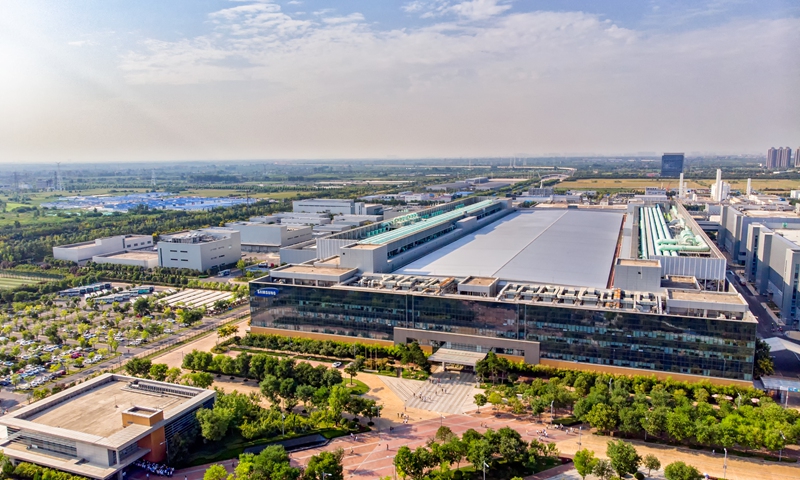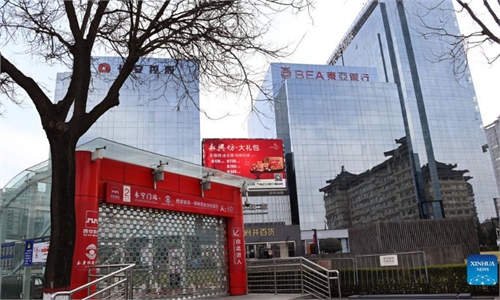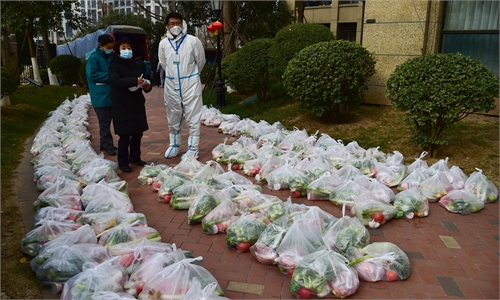
Samsung Electronics' semiconductor factory in Xi'an, Northwest China's Shaanxi Province Photo: VCG
Plants of major foreign chipmakers in Xi'an, capital city of Northwest China's Shaanxi Province, have continued their daily operations despite a lockdown in the city amid a new wave of COVID-19 cases, though their production capacity has been reduced somewhat to cope with strict anti-epidemic measures, industry insiders told the Global Times on Thursday.
As a major regional manufacturing and logistics hub, Xi'an has recently been under the global spotlight amid a growing speculation over potential disruptions to the global supply chain. Though minor delays could be seen, the overall impact on the global supply chain will be limited, the insiders said, pointing to the continued operations and China's ability to rein in outbreaks fast.
Currently, the production capacity of the chip producers in the city have been adjusted, but production will not be fully stopped, given the huge potential costs that may be involved should a suspension occur, an industry insider within the semiconductor industry told the Global Times on Thursday on condition of anonymity.
Samsung's affected level focuses on the difficulty of manpower shift arrangements due to measures such as crowd control, forcing the company to continue to produce on a limited manpower scale, but there has been no interruption in terms of its operation, according to a report that TrendForce, an industry information consulting company, sent to the Global Times.
The South Korean conglomerate's plants in Xi'an continue to produce on a limited staffing basis, while actively making adjustments to reduce the potential impact on output, TrendForce said, adding that the supply for raw materials, water and electricity required for production remain at sufficient levels.
"We will also take all necessary measures, including leveraging our global manufacturing network, to ensure that our customers are not affected," the company said.
Due to the ongoing COVID-19 situation, Samsung has decided to temporarily adjust operations at their manufacturing facilities in Xi'an, the company stated in its report on Wednesday.
The two factories of the Samsung in Xi'an fabricate 3D NAND high-end products, accounting for 42.3 percent of the company's flash memory chip production capacity and 15.3 percent of global supply. Samsung's factories in Xi'an are mainly responsible for the assembly of consumer products, including memory disks, which have a more direct impact on the purchase side of smart phones and laptops.
The insider noted that even if the factories such as the ones operated by Samsung halted, its actual impact on the supply chain would be very limited, since the products the factories produce are mostly in the NAND Flash category, which are adequately available in the market with sufficient inventories and are produced by multiple companies in China.
"The major chip production base is not exclusive to Xi'an, other places like Wuhan, Central China's Hubei Province, also takes the significant part in the global supply chain, but even during the hardest time of the epidemic last year, the supply chain remained resilient," the insider said, highlighting China's ability to control the epidemic, while ensuring the production operation.
A customer services staff member with the flagship store of Samsung on e-commerce platform Taobao said that there is no need to be worried about inventories as supply was currently adequate. Samsung will manage warehouse delivery according to the inventory situation, the staff member said.
US-based chipmaker Micron is also adjusting operations to ensure employee safety while keeping production running.
The city's anti-epidemic measures have reduced Micron's internal and contractor workforce at their Xi'an site, resulting in some impact on output levels of their DRAM assembly and testing operations, according to the latest statement the company shared with the Global Times on Thursday.
The US technology company is currently tapping their global supply chain, including their subcontractor partners, to help serve their customers, analysts with TrendForce said. While these efforts will allow them to meet most of their customer demand, there may be some near-term delays as they activate their network, experts said.
Industry insiders expect the output in the first quarter of 2022 to be lower due to the epidemic, but they said that despite the logistics difficulties caused by the Xi'an lockdown, Micron's DRAM contract price and delivery time for the first quarter of 2022 is expected to remain unchanged.



